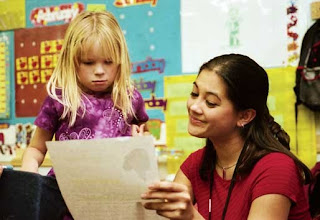
In everyday settings so many people get mixed messages, because of miss communication, and that often lead into a bad result. When deciding on the profession of being a teacher it is extremely crucial to be able to have appropriate communication going on in the classroom. If there is not a proper amount of communication it often leads to frustration and discouragement, and these traits can be portrayed in the early years because you need to give a good foundation to keep the children motivated. In the classroom it is important to “know your students” and by saying this you need to be able to take into account the socio cultural and linguistic differences of your students and be able to communicate with sensitivity and responsiveness to that. A teacher should never have a bias being in a classroom, just full respect for all individuals; because that is the message we want to teach as well.
I can’t really think of any time that fits this better than the first time I ever went and I helped the little girl Alyica with the hundred day of school crown making activity. The reason why this is stuck in my head is because it was meant to be a fairly easy activity, that the whole class would be doing, but she was struggling beyond belief. My heart really went out to her because as all the children were finishing up she was still working, and I wanted her to go meet up with the rest of the students in her class, but at the same point I could not just give her the answers. So we went over making her crown multiple times until she knew she had ten foam shapes on the ten triangles to equal one hundred pieces. At the end of the time I had with her, I went up to the teacher, and she was explaining how the little girl needed to go for some academic testing, because one minute she knows all the information and the next you could keep asking her and she has no idea what you’re talking about or what to do. As she was saying that I thought back to when I was helping her and I did realize that, because when we were counting to ten the numerous times we had to, she would say “1.2.3.4.5.6.7.8.9.10.” and then the next time she would say “1.2.5.8.9.3.10” and I was extremely confused because she had said both answers in 100% confidence.
I found this experience relatable to Christopher Kliewer, in “Citizenship in School: Reconceptualizing Down Syndrome” speaks about human reciprocity, which relates very much to democracy and communication in a classroom. Human reciprocity is basically when you are in a society where everyone works and interacts with each other. I believe this tied in well to my experience with Alycia because the teacher was working with her before I had the opportunity and then another student teacher worked with her, so we were all trying to offer her some incite to see her excel. Each member of the community has something different to bring to the table and everyone else in the group values what they bring. Kliewer also talks about Lev Semenovich Vygotsky, who was a psychologist. He believes in a higher ordered thinking, which makes us all unique in a way that we can exist in both social and cultural relationships. It is important for children in a classroom to make these relationships in order to better communicate in the classroom community.

This comment has been removed by the author.
ReplyDeleteI have to admit that I choked up a little bit when I read your example with the little girl and the crown getting left behind. I used to get left behind when I was in elementary and middle school, because I have a reading disorder. I like the idea of everybody working together to help each other. I think if I had somebody to help me through my reading disorder when I was younger, I wouldn’t have felt so left behind, and I might have had a more positive attitude about school. It would also be very helpful to that little girl if she had other positive people around her, encouraging her that she can do good in school as long as she tries. This relates a lot of Johnson’s article. He talks a lot about giving students the confidence they need to succeed in school. If they have more encouraging people around them, they will have more confidence in themselves, and they will perform better in school!
ReplyDeleteHi Gigi,
ReplyDeleteYou mention Vygotsky. He is relevant here. His contribution was this: children develop higher order thinking first in interactions with others. What a child can do today with help, she can do tomorrow independently. Your attention to the child building the crown will help her develop higher order thinking skills. It's beautiful, isn't it?
Keep me posted,
Dr. August